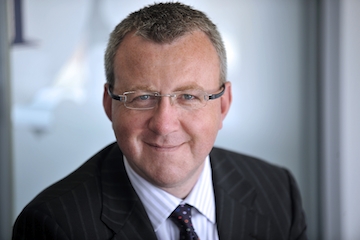The bond of trust between Financial Planner and client is one of the most essential elements of the profession but it is far from the norm in the financial services industry where many consumers often have very little trust in financial organisations.
Trust in institutions such as banks and insurance companies is at an all-time low with scandals such as the recent Barclays' Libor fine doing further damage. For this reason, and because of the decline in trust in financial services over the past few years, Financial Planner Shane Mullins has launched his IFP-backed Question of Trust campaign.
The campaign, set up in February and launched publicly in early July at Henderson's offices in the City of London, has been working towards developing and promoting a UK financial services industry that is recognised as being trustworthy, transparent, competent and customer-focused.
Chairing the launch meeting, IFP chief executive Nick Cann said that the IFP was wholeheartedly behind the Trust campaign and would do all that it could to support it. He said initiatives such as the IFP's Accredited Financial Planning FirmsTM register underlined the IFP's commitment to putting trust at the heart of good financial advice because high levels of trust were good for Financial Planners and consumers.
Over the past three months Mr Mullins, managing director of Accredited Financial Planning FirmTM Fiscal Engineers of Nottingham, the 2011 winners of the IFP's David Norton Award, has been organising research into attitudes toward trust including interviews with industry chief executives. Some 25 were interviewed by YouGov about their industry perspective on trust and the challenges it presents for them.
All of those questioned agreed that trust was a fundamental issue that required strong leadership and the correct cultures and structures to thrive. They attributed the lack of trust to misalignment between the interests of providers and the interests of the customer, the financial crisis and the lack of transparency around charging. Few companies actively measured trust, instead relying on proxy measures based on customer services or advocacy.
Mr Mullins argues that this was unacceptable and urges boards to put trust at the top of their agendas. He said: "Trust must be on the agenda of every board responsible for a financial services firm. For far too long the industry has held a mask up to itself instead of a mirror."
The campaign also looked at the development of a trust index which measures consumers' levels of active and forced trust. Forced trust is where a consumer trusts their bank or financial institution but only because they feel they have no alternative option. This compares to active trust where consumers actively trust their institution. Over 50 per cent of consumers said they felt forced to trust their own institution and trust for the financial services industry as a whole was even lower. It is for this reason that Mr Mullins wants to see a change.
He said: "If we fail to arrest these challenges, I fear we will breed a generation of mistrust and the social consequences, and impact, of this could be profound." The good news for Financial Planners though was that advisers had an active trust rating of over 60 per cent, 20 per cent higher than any other industry sector.
One of the aims for the IFP in requiring members to abide by its Code of Ethics has been to help improve professionalism and build trusts. One element focuses on integrity as follows: "The ultimate source of the public's trust is the member's personal integrity. Integrity demands honesty and candour which must not be sub-ordinate to the member's personal advantage. Within the characteristic of integrity, allowance can be made for innocent error and legitimate difference of opinion but integrity cannot coexist with deceit or subordination of one's principles."
A survey of 11,000 CFPCM professionals by the Financial Planning Standards Board also cited "acting in the clients' best interest" as the most important task of a Financial Planner. Mr Mullins said he wanted the industry to adopt a zero tolerance approach to issues which did not put the consumer at the right of the business.
The next stages of the campaign will focus on industry change, helped by Mr Cann who is responsible within the campaign for industry engagement. It is already supported by firms such as Dimensional, Transact and Vanguard who are all sponsors of the IFP and high profile individuals such as the Archbishop of Canterbury and MPs Chris Leslie, Mark Hoban.
This will be followed later in the year by work with consumers by campaign supporter Keith Tondeur of the charity Credit Action.
• Want to receive a free weekly summary of the best news stories from our website? Just go to home page and submit your name and email address. If you are already logged in you will need to log out to see the e-newsletter sign up. You can then log in again.

